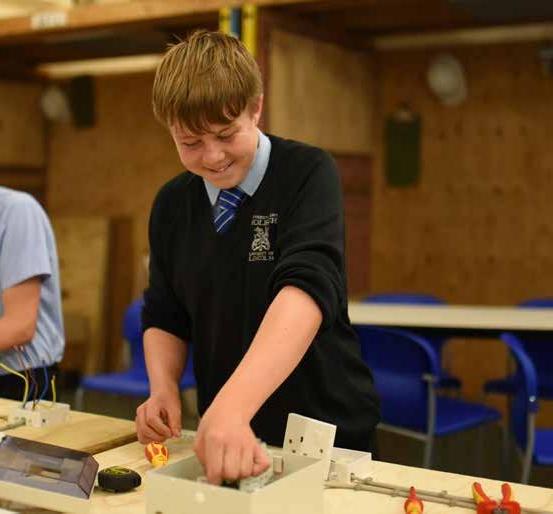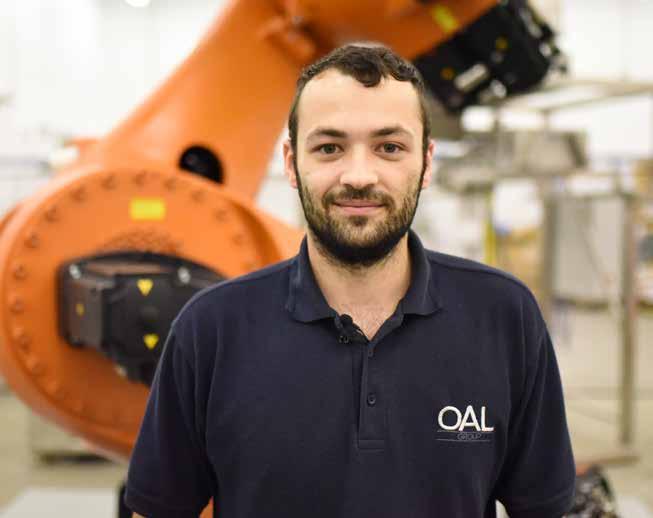
8 minute read
FOOD FOR THOUGHT
SPOTLIGHT ON TOBY WILKINSON AND THE UNIVERSITY OF LINCOLN
The power of visible pathways
TOBY WILKINSON, DEPUTY VICE CHANCELLOR AT THE UNIVERSITY OF LINCOLN, IS RESPONSIBLE FOR THE INSTITUTION’S WORK WITH OUTSIDE ORGANISATIONS, INCLUDING THE SOCIAL MOBILITY PLEDGE. HERE HE UPDATES ON THE UNIVERSITY’S ONGOING WORK IN DRIVING SOCIAL MOBILITY.
Q// The Holbeach campus, which is home to the National Centre for Food Manufacturing, is integral to your social mobility drive. Could you tell us a little bit about how it evolved over the years and the strategy behind it?
A// Holbeach is very much at the centre of the UK’s food manufacturing industry. A large amount of growing and manufacturing goes on there and many of the products we find on our supermarket shelves are made there. For many years we had a small campus there engaging with the local food manufacturing in terms of skills development and education. What really crystallised that presence in the south of Lincolnshire was the formation of our multi-academy trust. Back in in 2011 there was a merger of two secondary schools and we were approached as a university to see if we would take on sponsorship of that secondary school. Because the school was right next to our National Centre for Food Manufacturing we thought it would make a lot of sense to see what synergies we could find between the university-level provision and secondary education in the area. Over the years since 2011, the trust has expanded to five schools now spanning everything from primary to secondary, and now with our campus, tertiary opportunities, apprenticeships. We’ve created an entire educational ecosystem, where children and young people from the first time that they enter full time education can see a pathway through from primary to secondary, into university level education and into jobs with local industries. We worked really closely with the local food manufacturing sector, not only at university, but also to bring their contacts into the schools to help with apprenticeships and with the vocational provision at the academies. It’s been a fantastic experience for us in how we really put Holbeach on the map in terms of the food sector. [It’s about] creating those pathways or those opportunities for young people so that they can see a way all the way through to highly skilled, highly paid employment.
Q// And employers have really responded to this and actually more strategically looked at how they can locate higher skilled jobs there because you’ve really developed this national centre.
Crucially it creates higher skilled, higher paid jobs - so it’s “ a win for everyone
A// They’ve responded magnificently. For example, two of the really big players in the sector have members on the governing body of the trust. So they’re very involved in the strategy for the academy school. They also sit on an advisory body for the National Centre for Food Manufacturing. One of the critical things that I guess as a university we can bring to the table is our expertise in robotics, in automation and in the 21st century digitalisation of industry. That’s something which is very appealing to the food manufacturers because they can see how that will will help their industry in the future. Of course, really critically, it also creates higher skilled, higher paid jobs in an area which traditionally has been quite low skilled, low wage agricultural work. So it’s a win for everybody actually.

Q// Do you feel that it’s a model that other universities could really look at and adopt? A// I would really hope [so]. Obviously the industry sectors will differ in different parts of the country but I think universities have this extraordinary convening power. They are anchor institutions in many of their communities and are able to join the dots and link up different parts of the education and employment ecosystem in a way that creates real opportunity for people.
Q// And do you think getting into higher education has steadily become the norm in a place like Holbeach, instead of being something that a few children and young people did?
A// They’re much more familiar with it as an option for them. Because the university is heavily involved with the school, that whole concept of higher education is brought to the attention of children and their families from a much earlier stage. And because we share our facilities on the university campus, with our secondary school next door, it means those young people have the opportunity to access facilities, which they would never normally get in the school environment. It just creates that buzz of what higher education can open up and it becomes a much more normal part of the conversation for families in that area.
Q// One of the challenges for some students in terms of going to university is that they’re not sure what’s next. Whereas many of the young people in your area can now see there is this wider world of work and potentially a career in a local industry. So they have a good sense of the opportunities that lie beyond university.
A// Absolutely. It’s about creating those visible pathways so that a young person at the age of 16, instead of leaving school and getting a low pay job, can see that if they stay on and progress through into university, they can still get a job in their local area where they may wish to stay for family and other reasons. But it will be a much better paid job with better prospects - and this is not just a theoretical concept. They can see their peers who have gone before them who’ve done exactly that.
Food for thought in the levelling up agenda
THE UNIVERSITY OF LINCOLN HAS FOCUSED ON DEVELOPING A NEW MODEL TO TACKLE SOCIAL MOBILITY WHICH IS SUCCESSFULLY CREATING OPPORTUNITY IN A RURAL AREA, BUILDING ON THE STRENGTHS OF THE COMMUNITY THERE AND LEVERAGING THE PRIVATE SECTOR.
Its strong partnerships with schools and industry offer local young people the chance to aspire to a future outside the experiences of their parents that they would not have had without the University. The establishment by the University of Lincoln of a multi-academy trust, its campus in Holbeach and the National Centre for Food Manufacturing provide a clear path of progression for residents of Holbeach and the wider South Holland area. It provides a social mobility pipeline that covers primary, secondary and higher education, skills and training, and employment opportunities, catering to those seeking both academic and vocational routes into their career. The case studies included in this report are prime examples of the ‘joined up’ solution to the social mobility problem that the University of Lincoln provides by leveraging the Lincolnshire Educational Trust and its close partnerships with businesses through the National Centre for Food Manufacturing. The National Centre was successful in securing a multi-million pound investment from Innovate UK, the UK’s research investment service. This is clearly a significant headline figure but its true significance lies in the fact that the award would not have been made had the project not aligned with the long-term strategic objectives of the United Kingdom as a whole. Not only is the University of Lincoln and the National Centre for Food Manufacturing providing for the Holbeach area by supporting the Greater Lincolnshire Local Enterprise Partnership’s goal of futureproofing the agri-food industry, it is also supporting UK PLC and the goal in the Government’s Industrial Strategy to reach 2.4 per cent of GDP being spent on research and investment.
• The academy trust is now responsible for the education of over 2,500 young people across five schools. • The Centre supports over 350 apprentices in 70 businesses including Sainsbury’s and Tesco, Coca-Cola and Nestlé. • Bakkavor and OAL Group were anchor employers who formed a key part of the University’s successful bid to establish an Institute of Technology, helping to secure £13m of capital investment into local colleges and the National Centre to advance skills in engineering and manufacturing.
Lincoln and the surrounding areas had the potential to become increasingly economically deprived. Its poor geographic connections and sparse employment opportunities would have meant that many young people would have been forced to

either remain there with very few prospects, or move away to areas where they were more likely to find work. The University of Lincoln’s strategic programme of work has changed that landscape. It has provided local opportunities for local people that are a perfect fit for its rural environment but also look to the future of industry via digital and robotics capabilities. Crucially it has engaged large employers who now see the region as a talent pool that is relevant to their business needs. They have continued to work closely with employers and other local partners during the pandemic to ensure that teaching, training and learning can continue as fully as possible and that all pupils, students and apprentices are supported as much as possible. The CBI has regularly reported its concerns about a skills shortage in the UK. Two thirds of firms are already facing digital skills shortages. It has highlighted that by 2024 almost 50 per cent of jobs will require higher level education. The University of Lincoln is already addressing the issue by investing in local solutions that will help to future proof the region. But it recognises that these must be long-term projects which should be allowed to embed themselves into the community to be as effective as possible, and to continue to make a real difference. It is enabling young people to access opportunities which improve their lives and that of their communities, facilitating individual and regional social mobility. The work that the University of Lincoln has undertaken has been focussed, wide ranging and innovative. It has considered the challenges and skills shortages facing the area and pursued strategic partnerships, not only with other local organisations but also with global businesses. It should act as a blueprint for other universities to deliver similar results in areas where there are currently limited opportunities. This will be even more crucial as the country recovers from the impact of the pandemic. Young people need to be able to aspire to a better future for themselves and for their communities and the University is providing the means to level up Lincoln.










